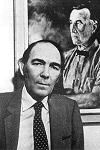 |
| |
30 years ago, the first review of John Gardner's
debut James Bond continuation novel "Licence Renewed"
was published in America...
|
|
First Licence Renewed Review
12th May 2011
On April 24th, 1981, the Miami News published
the first review of "License
Renewed", John
Gardner's
debut outing as James Bond continuation author. MI6 has extracted
the text from the archive as the book celebrates its 30th anniversary
and return to print.
Bond's Back With '80s Image - Miami
News - April 24th, 1981
There's great news for 007
aficionados. James Bond is back after a 14-year absence, with
his license to rub out foreign spies
intact. M, the cold-eyed chief of the Secret and Security Services,
is angry with attempts by the government to tie the hands of
his agents, but he tells Bond, "As far as I'm concerned,
007, you will remain 007."
|
"They can issue their pieces of bumf," M goes
on, "and abolish the Double-O section. We can simply
change its name. It will now be the Special Section, and
YOU are it. Understand, 007?"
Thus opens "Licence Renewed" by John Gardner,
sitting in for the late Ian Fleming, originator of the
James Bond secret agent series. It established new standards
in spy novels and dominated that international market for
years.
Gardner is an old hand in that field.
Some 20 years ago, when the James Bond cult was riding
high, Gardner wrote "The
Liquidator," which became a best-seller of the spy
genre. His first novel, it was made into an international
film and opened a series in which the adroit Boysie Oakes
capered. It was followed over the years by 22 other books,
including thrillers, suspense and adventure stories.
Gardner was selected by the holders of
the James Bond literary copyright to resume the series
where Ian Fleming
left off, and the pace is a fast one. |
|

Above: John Gardner pictured with
a portrait of James Bond creator Ian Fleming.
|
M assigns Bond to tackle a terrorist called
Franco and a wealthy nuclear scientist names Dr. Anton Murik,
the Laird of Murcaldy. He has supposedly invented a new type
of reactor which not only delivers tremendous nuclear power,
but also abolishes its nuclear waste. Other characters in the Bond
tradition are Dr Murik's mistress, beady-eyed, sinister Mary
Jane Mashkin; and his ward, lively
Miss Lavender Peacock, who collects boyfriends with a habit of
disappearing.
In briefing Bond, M warns him not to be taken
in by his old enemies, SMERSH, now allegedly replaced by the
more benevolent-minded
Soviet agents called "Department Viktor" It's
the same old gang of murderers, assassins, kidnappers and saboteurs,
M declares.
Under author Gardner's ministrations, Bond has changed - somewhat.
He goes easier on the booze, smokes special low-tar cigarettes,
and drives a fuel-efficient Saab instead of a gas-guzzling Bentley.
But the ladies? Hmmmmm.
Gardner is a native of the north of England,
son of an Anglican priest, and has served in the British Air
Force, the Fleet Air
Arm and the Royal Marines, where is was commissioned. After World
War II service, he studied for the priesthood, attended Cambridge
University, was ordained, but finally left the church. He was
a newspaper theater and film critic, then began a full-time writing
career. He now lives in Dublin.
In his new assignment, Gardner says, Bond remains
the same tough, world-wise, poker-faced, charming hero - with
changes, made because
the world and its attitudes have changed. He has read again all
the original Ian Fleming novels, and the new Bond, like the old
one, has been around and leaned a lot
- knowing how to handle people, head waiters, wine stewards and
menus. He is aware of the feminist movement, aware of the financial
pressure on governments and government departments, and the way
the world works today.
"Look," Gardner says, "what I really hope is
that people who either loved or loathed Bond in the '50s and
the '60s are going to say, 'Yes, that's the man we remember -
it's the same fellow -and he's grown up right along with us.'"